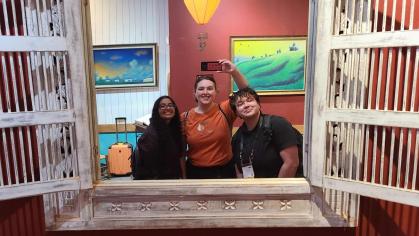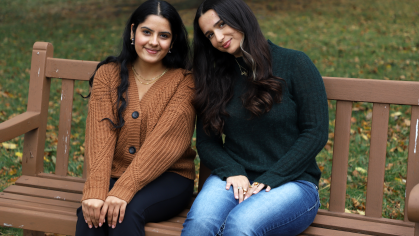The Africana: Gender and the Black Diaspora House, formerly named the Africana House, is an important component of both Douglass history and current college programming. The community is one of seven globally themed houses in the Douglass Global Village Living-Learning Community. Members of the community live together in a common residence hall, take a house course, and explore research interests in relation to the Black American, African, and Caribbean cultures in New Brunswick and beyond. Together, they learn about the contemporary issues facing members of the African Diaspora and explore Black feminist thought through cultural manifestations of identity politics.
Dahlia Woodley DRC’23 is a communications major minoring in Africana studies. She is a part of the 2021-2022 Africana: Gender and the Black Diaspora House and a Global Village Ambassador, a leadership position within the living-learning community.
“In class, we discuss contemporary issues that impact Black women and unpack the power systems from where these issues derive,” Woodley said. “As an Africana studies minor, I have always been interested in Black studies and seek to understand the Black diasporic history and experiences better. This experience allowed me to continue my educational endeavors in Black studies through an intersectional lens that centers on Black women.”
The cohort also works together on a year-long collaborative project. This year, students are creating a map of New Brunswick and the surrounding area that notates where students’ research interests are taking place. Student research projects range from current community topics to historic moments and cultural movements.
“Along with our map project, we also launched investigations that looked into the topics we chose from a global perspective,” Woodley said. “Other elements to our projects involve recording podcasts of our work with our subjects and planning a house event meant to engage the Douglass community in the conversations we have in class.”
These projects complement Woodley’s own academic interests, particularly how local and global topics can be connected.
“My understanding of global issues, especially women’s global issues, has broadened vastly,” she said. “This experience furthered my knowledge of how power structures, like patriarchy, cause women's problems to persist. My deeper understanding helps me bridge connections between Black women's experience in the United States with Black women and women of other races and ethnicities abroad. My classmates' work, especially for our ongoing project, opened my eyes to problems such as human trafficking, food insecurity, and homelessness that occur in the greater New Jersey area. These issues are often more prevalent among Black women and women of color.”
The Africana: Gender and the Black Diaspora House has a long history at Douglass. Originally known as the Afro-American House, the community was first founded in 1969. As explored in The Douglass Century, African American Douglass students staged protests in the aftermath of Dr. Martin Luther King Jr.’s assassination, calling for tangible, programmatic changes in the College’s curriculum and policies. Though initially resistant to reform, the College eventually responded by creating the Afro-American House as well as an African American studies program. Now part of The Global Village, the house provides a celebratory community on campus for students interested in exploring black identity, history, and culture.
Ultimately, Woodley feels programs such as the Africana: Gender and the Black Diaspora House and the Global Village are important parts of higher education.
“These programs are crucial because historically, Black women and LGBTQ activists have often not been given the same regard and credit as their heterosexual cis-gendered male counterparts,” she said. “Furthermore, Black women are often underrepresented in social justice conversations for Black people. Through my experience in this community, I gained perspective that I felt I was missing in some of my other educational experiences.”
The Africana: Gender and the Black Diaspora House continues to be a key feature in the Douglass experience today. To learn more about the Africana: Gender and the Black Diaspora House and other hlobal learning programs at Douglass, please click here.


